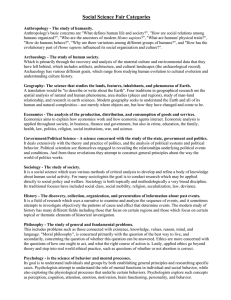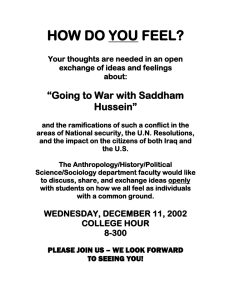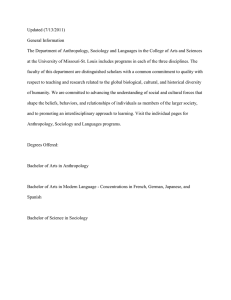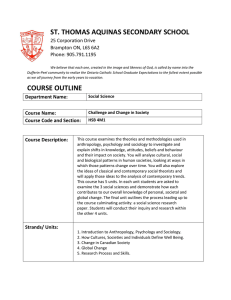UCSP Lesson 1 - Starting points for the understanding of culture, society, and politics
advertisement
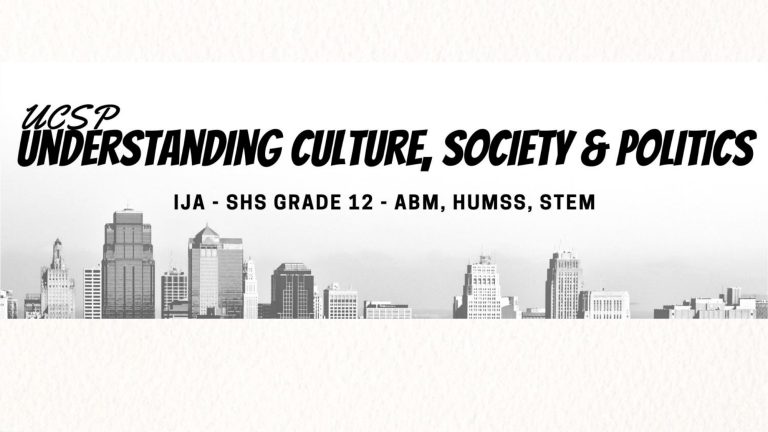
Understanding Culture, Society and Politics: Starting Points STARTING POINTS: The learners are expected to: - Acknowledge human cultural variation; - Social differences, social change, context of state and governance; - Understand the attitude towards different social, political and cultural phenomenon through observation/reflection; and - Highlights the value of the disciplines of anthropology, sociology and political science as three important branches of social sciences. CHAPTER 1: UNDERSTANDING CULTURE, SOCIETY AND POLITICS: SOME KEY OBSERVATIONS Lesson 1: Lesson 1: What Is Anthropology? Lesson 2: Lesson 2: What Is Sociology? Lesson 3: What Is Political Science? ANTHROPOLOGY is the scientific study of humanity or those aspects that make us human and the imprints of human achievement and progress. SOCIOLOGY is the systematic study of the human social life. (Charon) POLITICAL SCIENCE is a science of politics and politics as a governmental determination of who gets what, when and how. (Laswell) FIRST INTERSECTI Social sciences: deals with the function and structure of ON The three are classified as branches of the Social Sciences human society, as well as the interpersonal relationships of individuals as members of society. THIRD INTERSECTI ON Objectivity in science According to Charon, science is not merely observation, it is careful observation. Max Weber, describe science as “value-free” investigation. An attempt to carefully and systematically observe the world “as it is” rather than as we would like it to be. THIRD INTERSECTI ON Objectivity in science He means that the scientist’s only commitment must be to scientific investigation itself; the conclusions remain constantly open to further investigation. All social scientist agreed rules on posing a question, setting up hypothesis, testing the hypothesis, arriving at a conclusion and relating that conclusion to the original question posed. Concept Notes: • ANTHROPOLOGY o It is the discipline that tries to make sense on cultural beliefs and practices that many groups of people adhere to and plays a large influence in their lives. o It is the study of culture from past to present. The basis of the study of Anthropology is the culture of a race or a group of people. ∙ CULTURE o is seen in the beliefs, customs and traditions that are reflected on how people of a group behave and interact with others and their way of life. o It is different from one country to another. Even within the country itself lies many wonderful and varied cultures. ∙ CULTURAL DIVERSITY o means a range of different societies or people of different origins, religions, and traditions all living and interacting together. o It is culturally dictated when some of the factors are skin color, language, and ethnicity. o It is the result of the influences brought about by values, beliefs, customs, and traditions that a particular group of people adheres to Example: The tradition of “pagmamano” or kissing the hand of the elderly is a popular cultural practice in our country. It shows respect and reflects good behavior of the younger generations. Concept Notes: SOCIOLOGY • Sociology is the branch of Social Science that deals with the study of how man interacts with others in each set of rules and how these interactions are influenced by individual culture. • We also learn in Sociology that individuals are expected to learn and adapt to the widely accepted norms to gain entry and acceptance to any form of society to which they belong. • Values are what we believe as morally correct based on the culture and experiences which guide us in our decisions and how we interact with others in society • Beliefs are things accepted as true or real and take the form of firmly held opinion or conviction regardless of the lack of verifiable evidence • Sociality is the qualities that are expected from us by the society where we belong. • Our sociality is determined by many factors that we call “categories.” Our roles in society are largely based on the “labels” that we possess. Some of them are as follows: male/female, rich/poor, tall/short, and even the color of our skin. • Society is the unseen force that determines the stature and the expectations given to every member. Examples: VALUES: Tina was taught never to cheat during exams and so she studies in preparation for her tests. In one of her exams, she was not able to study because she still had a lot of projects to finish. During the test, she found it difficult to think of the correct answers and she then noticed that her classmates were copying from one another as one of them had a “kodigo.” Then they told her if she wanted to, she could also copy. Tina was tempted to join but decided not to because she knew it was wrong. In the end, their teacher discovered what her classmates had done, so they failed the entire semester as a consequence. BELIEFS: After attending a wake, Joel and his family did not come home straight. They stopped by a fast-food restaurant to have some snacks before going home because they believed that the spirit of the dead would follow them to their house that could cause misfortune to their family. This belief is what we call “pagpag.” Concept Notes: In the field of politics, there are many and varied fields that specialize in different aspects so that the government can function efficiently. • POLITICAL SCIENCE • It is the systematic study of government and politics. • It makes generalizations and analyses about political systems and political behavior and uses these results to predict future behavior or outcome that is vital in determining the success or failure of a government. • It is the aspect of everybody’s life that determines how society and culture is shaped because the government takes care of everyone who is under its governance. The kind of government that a society has dictates what kind of life the citizens enjoy in one particular country regardless of groups and culture. Examples: There are fields in Political Science that deals with studying the nature of the political system of other countries to be able to maintain good ties with their respective governments.
